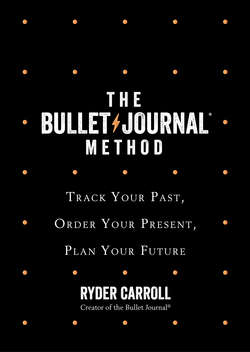Читать книгу The Bullet Journal Method: Track Your Past, Order Your Present, Plan Your Future - Ryder Carroll - Страница 15
HANDWRITING
ОглавлениеThe palest ink is better than the best memory.
—CHINESE PROVERB
We breathe life into our thoughts by committing them to paper. Be they words, images, or notes, few tools facilitate the transition between the inner and outer worlds as seamlessly as the tip of a pen. In a world moving toward untextured interfaces, it may seem like an awkward step backward to implement a methodology that requires you to write things out the old-fashioned way. But a growing body of research points to the continued practicality of the handwritten word in our digital age.
A University of Washington study demonstrated that elementary school students who wrote essays by hand were far more likely to write in fully formed sentences and learn how to read faster. Much of this is due to how handwriting accelerates and deepens our ability to form—and therefore recognize—characters.17
The complex tactile movement of writing by hand stimulates our mind more effectively than typing. It activates multiple regions of the brain simultaneously, thereby imprinting what we learn on a deeper level. As a result, we retain information longer than we would by tapping it into an app.18 In one study, college students who were asked to take lecture notes by hand tested better on average than those who had typed out their notes. They were also able to better retain this information long after the exam.19
When we put pen to paper, we’re not just turning on the lights; we’re also turning up the heat. Writing by hand helps us think and feel simultaneously.
These studies and many like them indicate that the benefits of writing by hand stem from the very complaint consistently leveraged against it: inefficiency. That’s right: The fact that it takes longer to write things out by hand gives handwriting its cognitive edge.
It’s pretty much impossible to hand-transcribe lectures or meeting conversations verbatim. When we write by hand, we’re forced to be more economical and strategic with our use of language, crafting notes in our own words. To do that, we have to listen more closely, think about the information, and essentially distill others’ words and thoughts through our own neurological filtration system and onto the page. Typing notes, in contrast, can quickly become rote: a frictionless highway where information freely passes in one ear and right out the other.
Why is it so important to craft notes in your own words? The science suggests that writing by hand enhances the way we engage with information, strengthening our associative thinking. It allows us to form new connections that can yield unconventional solutions and insights. We’re simultaneously expanding our awareness and deepening our understanding.
How we synthesize our experiences shapes the way we perceive and interact with the world. This is why journaling has proven to be a powerful therapeutic tool in treating people who suffer from trauma or mental illness. Expressive writing, for example, helps us process painful experiences by externalizing them through long-form journaling. Cognitive behavioral therapy (CBT) uses scripts to treat people obsessing over intrusive thoughts. A distressing thought is detailed in a short paragraph. This script is then written over and over again until the thought begins to lose its death grip on the person’s mind, granting some much-needed perspective and distance—something we all struggle to find when dealing with challenging situations.
Toward our latter days, writing can help preserve our most cherished memories. Studies suggest that the act of writing keeps our minds sharper for longer. I’ve received many emails over the years praising Bullet Journal for helping those with poor memories stay organized, regardless of age. For instance, Bridget Bradley, a fifty-one-year-old Bullet Journalist, now remembers “what the weather was like three months ago, how many times I went to the gym last month, that I have made a reservation (by email) for that restaurant table, that I am going on holiday in July, and that I have already worked out what I need to take with me (six months in advance!) so that I have time to buy and prepare for it.” Similarly, I’ve heard from numerous people who found that Bullet Journaling helped their memory improve after being compromised by trauma or medical procedures.
A dear friend of mine once told me, “The long way is the short way.” In a cut-and-paste world that celebrates speed, we often mistake convenience for efficiency. When we take shortcuts, we forfeit opportunities to slow down and think. Writing by hand, as nostalgic and antiquated as it may seem, allows us to reclaim that opportunity. As we craft our letters, we automatically start filtering the signal from the noise. True efficiency is not about speed; it’s about spending more time with what truly matters. In the end, that’s what the Bullet Journal method is all about.
